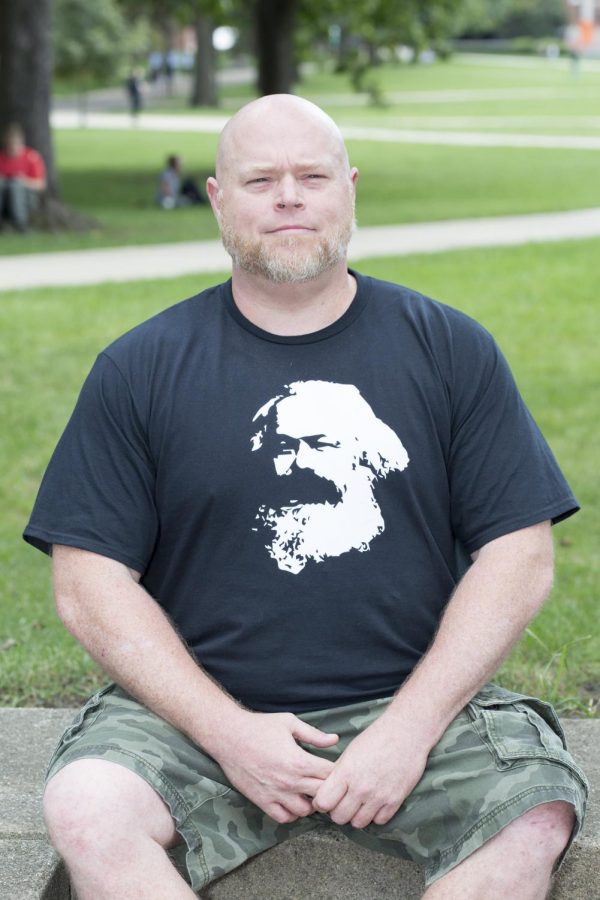In the name of justice: opportunities for the previously incarcerated
Taken outside the quad Monday, Sept. 10th 2018, this is a portrait of Chris Miner who is a volunteer at FirstFollowers
September 26, 2018
Every year, more than half a million people in the United States are released from prison, according to the Department of Justice.
For many, the transition that follows is a tumultuous one, riddled with anxiety and an inability to return to normal life. Additionally, almost two-thirds of those released are rearrested within three years, according to the DOJ.
Chris Miner’s story was similar.
“I served about a year and a half in prison,” Miner said. “And it wasn’t just that — I was arrested about 15 times and I’ve served multiple things in the county.”
Today, when Miner is not in class as a graduate student at the University, he serves as a mentor for FirstFollowers, a Champaign-based community organization which provides support services to the formerly incarcerated.
Get The Daily Illini in your inbox!
After serving a few more stints in prison for minor charges, Miner returned to school. This, for Miner, was nothing short of a nighttime epiphany.
“It just kind of came over and was like ‘you have to do something about this at this age,’” Miner said. “I’ve been in restaurants my whole life, so maybe it was realizing that working (in a) restaurant I was going to go nowhere.”
He explained that he felt like a time bomb just waiting to make another mistake. Miner made it his goal to defuse this ticking time bomb that had led him down an unfortunate path.
“I got out and realized there was a lot of survivor’s guilt during that time because everything kind of fell into place for me. I’m now a grad student at the U of I.”
James Kilgore, co-director at FirstFollowers and a co-worker of Miner, shares a similar story to him.
After being incarcerated for almost six years, Kilgore noticed there was not a support system for people like him. That is when Kilgore came across Miner, who had similar aspirations for post-incarceration.
“We bond with each other, we connect with each other,” Kilgore said. “We come home and carry the stigma of incarceration and a lot of people look down on you because you have a prison record.”
Kilgore described Miner as someone who brings a lot of energy into their organization. He also said that Miner really likes to make things happen.
Before his time at FirstFollowers, Miner volunteered at the Education Justice Project.
EJP, which is a school-sponsored program, heads a prison education program for inmates and works to promote education and awareness regarding criminal justice and incarceration.
Nick Hopkins, student at the University’s College of Law and coordinator at EJP, had the opportunity to work alongside Miner.
Despite coming from very different backgrounds, Miner and Hopkins were able to share their common goal of developing post-incarceration opportunities through activism.
At FirstFollowers, conversely, the program uses a hands-on approach, by working directly with members through counseling and job assistance.
Miner’s dedication to social issues is apparent to those he has worked with.
“I’m thinking Chris is someone unique in the way that he’s very outgoing,” Hopkins said. “It worked very well in our group and for the events we did.”
Additionally, Miner’s willingness to speak about his personal experiences and his willingness to help others has given him the ability to inspire.
An inspiration is an understatement for someone like Miner, who has made the most of his time since being incarcerated.
Miner holds an associate’s degree in Political Science and a bachelor’s degree in Urban and Regional Planning and is currently pursuing a master’s in Social Work.
As a graduate student, Miner is still deciding if he will pursue his Ph.D., expressing his reservations towards academia’s jargon.
“I don’t like the language they use,” said Miner. “I want it to be that some 18-year-old kid can read it. They could become an activist someday.”
Miner is willing to welcome all people who want to better themselves into his program.
“We need all kinds of outsiders,” he said. “I don’t care if you’ve been to prison or not. If you’re a rich kid or poor kid and you roll with us, let’s do this.”
Being immersed in prison life helped Miner gain a perspective on many social issues and the systematic problems that exist regarding the prison system.
Awareness of privilege has become a common theme for Miner, who now puts much of his time into helping those who did not get so lucky. If you’re at the intersection of being a black male and being poor, Miner said that this a highly unfair disadvantage.
“Many of the African-Americans I was locked up with were innocent of the crime they committed. And I don’t think that they were lying because they said, ‘Oh, no, I should be here. I’ve done stuff. I’m just paying for something else,’” Miner said.
In addition to paying it forward, speaking up in the context of today’s political climate serves as one of Miner’s biggest motivators.
“If I just shut up and nobody else takes the mantle, it just gets pushed aside,” Miner said.
As other social movements garner media attention, Miner hopes that better support for the formerly incarcerated will pick up steam in the coming years.
He wants those who are released to view the commonly grim situation as a second chance rather than a revolving door, that all hope is not lost.
“I made it through and I survived, and now I’m thriving,” Miner said.







